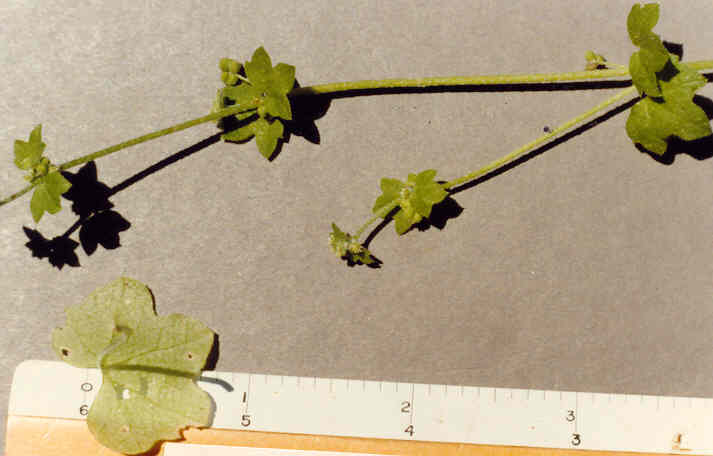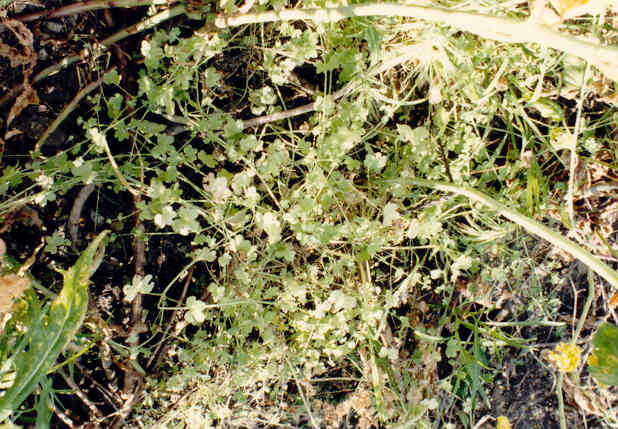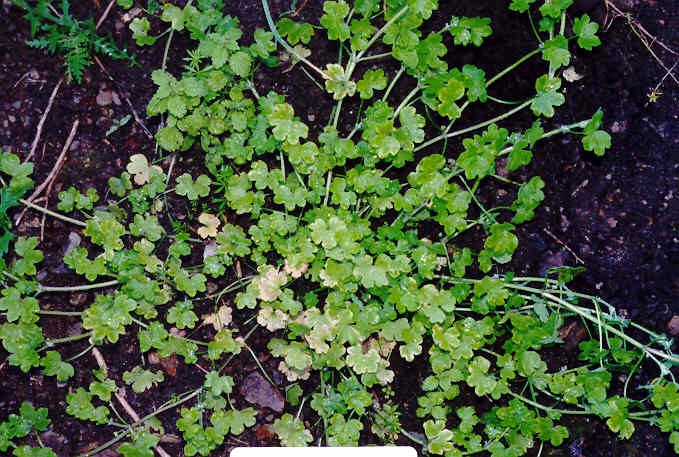
 |
Bowlesia incana R. & P.Apiaceae (Carrot Family)NativeBowlesiaAmerican Bowlesia |
May Photo
Plant Characteristics:
Slender branching annual with stellate pubescence; delicate, with weak
trailing stems 1-5 dm. long, dichotomously branched; petioles slender, 2-8 cm.
long; lf. blades thin, reniform to cordate in outline, 5-30 mm. broad, 5-7
lobed, the lobes entire or toothed; umbels on axillary pedicels 1-6-fld., on
short peduncles, fls. white, minute; sepals rather prominent, fr. 1-1.5 mm.
long, sessile or subsessile, broadly ovoid, stellate-pubescent, with narrow
commissure and lacking ribs or oil-tubes, the dorsal part of each carpel turgid.
Habitat:
Shaded places below 2500 ft.; S. Oak Wd., Coastal Sage Scrub, etc.; n. L.
Calif. through cismontane Calif. to cent. Calif.; desert edge; Santa Catalina,
San Clemente, Santa Rosa, Santa Cruz Ids.; to La.
March-April.
Name:
Named for William Bowles,
1705-1780, Irish Naturalist and traveler. (Munz, Flora
So. Calif. 72). Latin, incanus,
hoary. (Jaeger 126).
General:
Occasional along the shaded, north facing bank between the Newporter Inn
and San Joaquin Hills Dr. (my comment).
There are some striking cases of discontinuous distribution that probably
represent relic distribution, with certain areas maintaining old species because
of special soil and precipitation factors, for example species in the mountains
of San Diego County and cismontane central California. California (largely
cismontane) with the other states of our west coast and extreme South America
have over 100 species closely related or perhaps identical:
Phacelia magellanica group, Gilia,
Larrea, Prosopis, Apiaceae like Bowlesia
incana, Sanicula crassicaulis and S.
graveolens. So far, sporadic long-distance transtropical dispersal seems
to be a hypothesis for explanation of this discontinuity; most such species are
self compatible so that a single introduction might suffice.
(Munz, Flora So. Calif. 7).
About 15 spp., mostly of Latin Am. (Munz,
Flora So. Calif. 72).
Text Ref:
Abrams Vol. III 218; Hickman, Ed. 142; Munz, Flora
So. Calif. 72; Roberts 7.
Photo Ref:
May 1 87 #4,5,6;
Identity: by John Johnson.
First Found: May 1987.
Computer Ref: Plant Data 300.
Have plant specimen.
Last edit 3/3/05.
 |
 |
May Photo February Photo